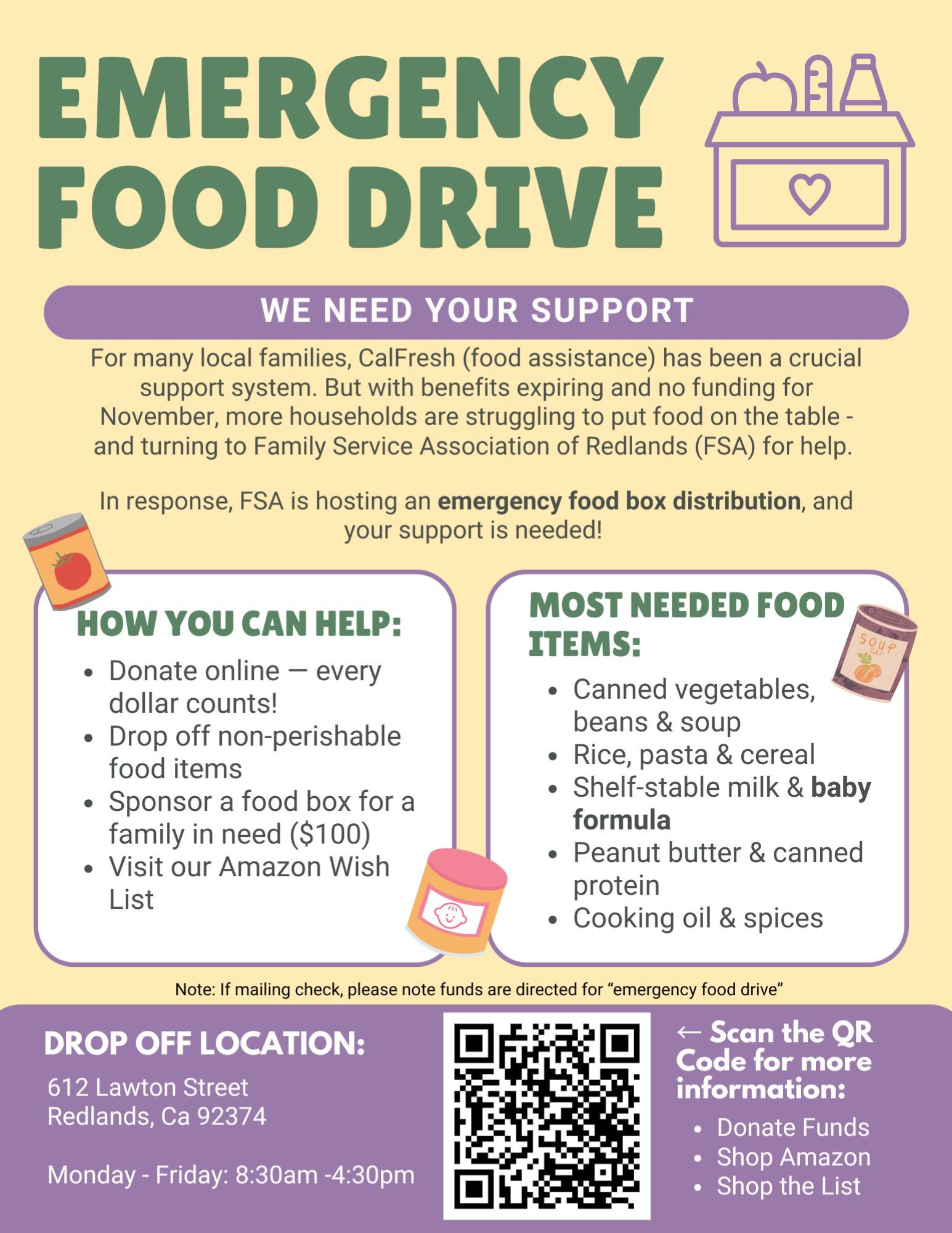LOOK Dine-In Cinemas in Redlands appears closed amid bankruptcy
Moving trucks, missing showtimes and an ongoing Chapter 11 case raise questions about the theater’s status.
With federal funding for CalFresh on hold, Redlands Family Service Association is stepping up to feed families who could lose their benefits starting Nov. 1 — and the nonprofit is calling on the community to help.

REDLANDS, Calif. — As thousands of households in San Bernardino County face the possibility of a lapse in food-assistance benefits beginning Nov. 1, the Family Service Association of Redlands (FSA) is mounting an emergency food-box distribution to support families impacted by the disruption.
Why it matters: The federal government’s shutdown has triggered delays to the Supplemental Nutrition Assistance Program (SNAP), known in California as CalFresh, putting local recipients at risk of missing timely benefit payments.
In response, FSA will host two free, no-registration Emergency Food Box Distribution at its Redlands campus (612 Lawton St.) next week.
"Family Service is prepared to come alongside families during this difficult government shutdown," said Kyra Stewart, executive director of the Redlands Family Service Association in a message to CFR. "We are providing a supplemental food box with essentials like cereal, peanut butter, soups and canned goods to families and individuals affected by the SNAP program, as well as government workers without a paycheck."
The food distribution will take place from 9 a.m. to 4:30 p.m.:
Participants should bring their EBT card with ID or proof of government employment, if applicable.
Regular monthly food-box distributions will follow Nov. 18–21.
FSA is calling on community members to contribute to its emergency food drive to restock shelves and sustain local families through the shutdown.
Most needed food items include:
Ways to help:
Contributors are asked to mark mailed checks for the “emergency food drive” fund.
Stewart said the organization’s mission has always been to stand with residents who are vulnerable, food insecure or facing housing instability.
According to the California Department of Social Services, more than 460,000 residents in San Bernardino County receive CalFresh benefits — about 20 percent of the population. With benefits set to expire and no congressional budget deal in place, local food banks are bracing for an influx of new clients.
County data show that children make up 61 percent of CalFresh participants locally, while adults ages 18–64 account for 27 percent, according to the county’s Indicators Dashboard.
Local advocates and FSA warn that even a short disruption could leave vulnerable households scrambling for meals.
In an email seeking emergency donations, FSA noted that CalFresh is a "critical support system" for many local families and with benefits expiring more families are struggling to put food on the table.
The Special Supplemental Nutrition Program for Women, Infants and Children (WIC) in California is safe - for now.
On Oct. 10, the Trump administration announced it would direct $300 million in unspent tariff revenue to keep the program afloat. In California, the program is expected to continue to serve and enroll eligible families through Nov. 30, according to the California Department of Public Health. Those who receive SNAP benefits and are pregnant, breastfeeding or have a child under five, are automatically eligible for WIC.
The CDPH/WIC Division reports the program serves nearly 1 million Californians monthly, and “60 percent of all California resident births in a given year are eligible for the WIC program,” CDPH said.
Earlier this week, Governor Gavin Newsom and Attorney General Rob Bonta announced that California, along with more than 20 other states, is suing the Trump administration over what they called the administration’s unlawful refusal to fund SNAP benefits during the nearly month-long federal government shutdown, despite having funds available to support the program in November.
According to the lawsuit, the United States Department of Agriculture (USDA) under President Trump is needlessly suspending November SNAP benefits, causing 5.5 million Californians to lose critical access to $1.1 billion in food assistance.
In response, the USDA blamed Congressional Democrats and stated the Anti-Deficiency Act bars federal agencies from spending funds not appropriated by Congress. The agency also said it would not use the SNAP emergency reserves calling the option "legally dubious and practically disastrous."
Back home, FSA urged community members to spread the word and encouraged anyone with time or resources to volunteer or donate food. The organization also encouraged local retailers to continue honoring EBT cards while federal systems are delayed.

Originally published 10/30/25 at 11:05. Updated 12:59
Sign up for our weekly newsletter